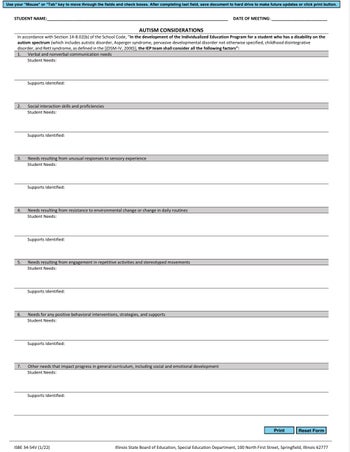Understanding the Idea Law
Empowering SPED Parents: Stronger Informed & Together! is committed to providing parents with the knowledge and resources they need to navigate the Individuals with Disabilities Education Act (IDEA). Stay informed with Special Education IDEA laws, rules, fundings, and violations found in public schools.
Navigating Idea: Know Your Rights
The laws within IDEA are designed to protect your child's right to a free and appropriate public education (FERPA). We're passionate about sharing these laws to empower you in advocating for your child's needs.
Overcoming Challenges with IDEA
One of the biggest hurdles for parents is understanding the complex legal language of IDEA. This page aims to address this by breaking down the laws into simple, understandable terms, ensuring you are well-informed and confident.

IDEA Law: Who is required to be at my child's IEP meeting?
Required IEP Team Members:
IDEA STATUE 34 C.F.R. § 300.321(a)
- Parent(s) of the child
- The parents are essential participants with equal decision-making authority.
- At least one regular education teacher of the child (if the child is, or may be, participating in the regular education environment).
- Required to help determine appropriate accommodations and supports.
- If a regular education teacher IS NOT PRESENT, YOU THE PARENT can cancel the meeting! You have that POWER!
- At least one special education teacher, or special education provider of the child.
- Ensures that specialized instruction needs are addressed.
- If a regular education teacher IS NOT PRESENT, YOU THE PARENT can cancel the meeting! The SPED director DOES NOT fill this roll.
- A representative of the public agency (often an administrator) who:
- Is qualified to provide or supervise specially designed instruction,
- Is knowledgeable about the general curriculum, and
- Is knowledgeable about the availability of the district’s resources.
- An individual who can interpret the instructional implications of evaluation results
- May be one of the above members if qualified.
- Other individuals who have knowledge or special expertise regarding the child, at the discretion of the parent or school.
- Can include related service providers, advocates, or others.
- The child, whenever appropriate.
- Required to be invited starting no later than the first IEP in which postsecondary goals are discussed (transition planning, beginning not later than age 16, or younger if appropriate) under 34 C.F.R. § 300.321(b)
- I remember attending 504 meetings twice in high school. It was helpful for me to talk about my struggles with my parents there as a support.
Key Citations
- 34 C.F.R. § 300.321 – IEP Team
https://www.ecfr.gov/current/title-34/subtitle-B/chapter-III/part-300/subpart-D/section-300.321 - 20 U.S.C. § 1414(d)(1)(B) – Federal statute outlining the IEP team members.

IDEA Law: AUTISM
AUTISM- 34 C.F.R. § 300.8(c)(1)
(i) Autism means a developmental disability significantly affecting verbal and nonverbal communication and social interaction, generally evident before age three, that adversely affects a child’s educational performance. Other characteristics often associated with autism are engagement in repetitive activities and stereotyped movements, resistance to environmental change or change in daily routines, and unusual responses to sensory experiences.
(ii) Autism does not apply if a child’s educational performance is adversely affected primarily because the child has an emotional disturbance, as defined in paragraph (c)(4) of this section.
(iii) A child who manifests the characteristics of autism after age three could be diagnosed as having autism if the criteria in paragraph (c)(1)(i) are satisfied.
- Autism is one of the specific disability categories under IDEA. According to IDEA’s Part B (education for children ages 3–21), students can qualify for special education if they fall into one of the 13 disability categories—and autism is included among them.
- The 1990 amendments to the original IDEA (initially enacted in 1975) explicitly added autism (and traumatic brain injury) to the list of recognized disability categories.
- IDEA also provides a definition for autism under Part B. It describes autism as:
“a developmental disability significantly affecting verbal and nonverbal communication and social interaction, generally evident before age three, that adversely affects a child’s educational performance.” - The law also gives a specific definition of autism, focusing on communication and social interaction impairments with educational impact, typically evident before age three.
- These provisions ensure that students with autism can be evaluated for eligibility and receive necessary special education services and supports under IDEA.

Autism vs Educational Autism
1. Medical Autism
- Who decides: Diagnosed by a medical professional (developmental pediatrician, psychologist, neurologist, etc.).
- Criteria: Based on the DSM-5 criteria for Autism Spectrum Disorder (ASD) — focuses on clinical signs, developmental history, and behavior patterns.
- Purpose: Used for healthcare, therapy outside school, insurance coverage, and personal understanding of the condition.
- Impact on school services: A medical diagnosis does not automatically guarantee special education services.
2. Educational Autism (IDEA eligibility category)
- Who decides: Determined by a school’s evaluation team through the IDEA process.
- Criteria: Must meet IDEA’s definition of autism (34 C.F.R. § 300.8(c)(1)) and show that it adversely affects the child’s educational performance.
- Purpose: Used to determine if a student qualifies for an IEP with specialized instruction and supports.
- Key point: A child could have a medical autism diagnosis but not qualify for an IEP if the school decides it doesn’t significantly impact educational performance.
Conversely, a child could meet IDEA’s autism criteria without having a formal medical diagnosis (though this is less common).


504 PLAN VIOLATIONS
1. Not Following the 504 Plan
• The school agrees to certain accommodations (extra test time, breaks, seating, etc.) but staff don’t actually do them.
• Example: The plan says a student gets tests read aloud, but the teacher hands out silent written tests.
2. Delaying or Denying Evaluation
• The school waits too long or refuses to evaluate a student after a parent requests it, even when there’s clear evidence of a disability affecting learning.
3. Discrimination in Activities
• Not allowing the student to join sports, clubs, or field trips because of their disability or needed accommodations.
4. Lack of Equal Access
• Not providing accessible materials, technology, or physical access (like ramps, elevators, or captioning), making it harder for the student to participate.
5. Retaliation
• Punishing or treating a student/parent differently because they asked for 504 accommodations or filed a complaint.
6. Forcing the Student Into a More Restrictive Setting
• Placing a student in special classes or away from peers without a valid reason tied to their disability needs.
7. Not Involving Parents
• Making major changes to the 504 plan without parent input or without notifying them in advance.

HOW MANY DAYS?
It's hard keep track of our children's schedules, and then to add all the SPED deadlines to keep track of- IT'S ALOT! But, in the state of Illinois, it's important to remember:
Once you request an IEP meeting, the SPED department, or administrator in charge, has 10 calendar days to send notice/schedule the IEP meeting.
Key Points
- The district has 10 calendar days to either:
- Hold the meeting, or
- Send the written notice scheduling the meeting for a future date.
- Once the notice is sent, Illinois still requires at least 10 calendar days’ advance notice before the meeting itself (23 Ill. Admin. Code § 226.220(a)), unless the parent agrees in writing to waive that notice
If you request a meeting:
- By day 10, they must at least send you the written invitation with the meeting date.
- The meeting itself will typically be later — often 2–3 weeks after the request — unless you waive the 10-day advance notice to speed things up.
- State level: In Illinois, failure to comply can be reported to the Illinois State Board of Education (ISBE) Special Education Department via a state complaint.
- Federal level: The delay could also be considered a denial of FAPE under IDEA if it causes harm to your child’s education.If an Illinois school district doesn’t respond within 10 calendar days to your IEP meeting request, they are violating 23 Ill. Admin. Code § 226.220(d) — and that can be treated as noncompliance with both state and federal special education law.
- If you request an IEP meeting and the Special Education administrator does not respond promptly to your email, it is recommended that you follow up every other day. This consistent communication creates a clear paper trail and provides documented proof that you made repeated attempts to schedule the meeting. If the 10-day deadline passes without a response, this documentation can serve as evidence of the district’s failure to comply.
Sample Letters. Feel free to copy, paste, edit, and use!
Letter Keeping 10 Day Notice
Re: Request for IEP Meeting – [Child’s Name], DOB [MM/DD/YYYY]
Dear [Administrator’s Name],
I am formally requesting an IEP Team meeting for my child, [Child’s Name], in accordance with 34 C.F.R. § 300.324(b)(1)(ii)(C) and 23 Ill. Admin. Code § 226.220.
Under 23 Ill. Admin. Code § 226.220(d), when a parent requests an IEP meeting, the district must either convene the meeting or send written notice of the meeting within ten (10) calendar days of the request. Furthermore, 23 Ill. Admin. Code § 226.220(a) requires the district to provide at least ten (10) calendar days’ written notice before the meeting date unless the parent waives this requirement.
For the record, I am not waiving the 10-day advance notice requirement. Please ensure that the meeting is scheduled in compliance with both the scheduling deadline and the notice requirement.
Please confirm the meeting date and time in writing no later than [insert reasonable deadline]. I am available on [list at least three possible dates/times].
Thank you for your attention to this matter. I look forward to working collaboratively to ensure that [Child’s Name] receives the Free Appropriate Public Education guaranteed under IDEA.
Sincerely,
[Your Full Name]
Parent of [Child’s Name]
Letter waiving 10 day notice
Re: Request for IEP Meeting – [Child’s Name], DOB [MM/DD/YYYY]
Dear [Administrator’s Name],
I am formally requesting an IEP Team meeting for my child, [Child’s Name], in accordance with 34 C.F.R. § 300.324(b)(1)(ii)(C) and 23 Ill. Admin. Code § 226.220.
Under 23 Ill. Admin. Code § 226.220(d), when a parent requests an IEP meeting, the district must either convene the meeting or send written notice of the meeting within ten (10) calendar days of the request. Additionally, 23 Ill. Admin. Code § 226.220(a) requires at least ten (10) calendar days’ written notice before the meeting unless the parent agrees otherwise.
To expedite this process, I am waiving the 10-day advance notice requirement in writing so that the meeting can be held as soon as possible. I request that you provide available dates immediately, with the goal of meeting no later than [insert preferred date].
Please confirm the meeting date and time by [insert response deadline, e.g., within 3 business days]. I am available on [list at least three possible dates/times].
Thank you for your prompt attention to this matter. I look forward to working together to ensure that [Child’s Name] receives the services and supports required for a Free Appropriate Public Education under IDEA.
Sincerely,
[Your Full Name]
Parent of [Child’s Name]
Letter of Non-Compliance
Re: Notice of Noncompliance – Failure to Respond to IEP Meeting Request for [Child’s Name], DOB [MM/DD/YYYY]
Dear [Administrator’s Name],
On [insert original request date], I submitted a written request for an IEP team meeting for my child, [Child’s Name], in accordance with 34 C.F.R. § 300.324(b)(1)(ii)(C) and 23 Ill. Admin. Code § 226.220(d).
Under 23 Ill. Admin. Code § 226.220(d), the district is legally required, within ten (10) calendar days of such a request, to either convene the IEP meeting or send written notice scheduling the meeting for a future date. Today is [insert date], which is more than 10 calendar days since my request, and I have not received any written notice or meeting date from the district.
This constitutes noncompliance with Illinois special education regulations. Failure to respond in the required timeframe also risks a denial of FAPE under IDEA if it delays needed services or changes to my child’s program.
Please provide me with a written meeting notice by [insert short deadline, e.g., 2 business days from today]. If I do not receive this by that date, I will have no choice but to file a formal state complaint with the Illinois State Board of Education for investigation.
I look forward to your immediate response so we can resolve this without escalation.
Sincerely,
[Your Full Name]
Parent of [Child’s Name]

Stay Informed & Empowered
Don't navigate the complexities of IDEA alone. Empowering SPED Parents: Stronger Informed & Together! offers the support and information you need. Stay informed with Special Education IDEA laws, rules, fundings, and violations found in public schools.